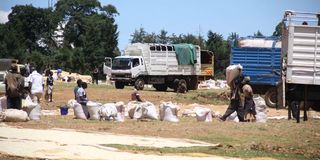NCPB, millers in cut-throat maize buying contest

Maize drying in Eldoret in this file photo before the produce is sold to the National Cereals and Produce Board, Eldoret depot.
The National Cereals and Produce Board (NCPB) has finally entered the maize market purchasing the crop at competitive rates.
This has triggered price rivalry with millers to the benefit of farmers caused by increased demand for the produce due to low yield last season.
The government agency is purchasing the cereal on behalf of the World Food Programme (WFP) at Sh5,100, compared to Sh4,800 offered by the traders.
“We target to purchase 30,000 bags of 90-kilogram bag of maize under the WFP deal mainly at our Eldoret depot,” Titus Maiyo, NCPB corporate communications manager said.
He asked farmers to take advantage of the pact noting that they receive payment in less than 24 hours upon delivery of the produce.
A spot check by the Daily Nation indicated mounting ques of farmers waiting to deliver the produce as they prepare for next planting exercise.
“Such a cut-throat competition by millers and NCPB will push the prices high and enable farmers to earn better returns to invest in the next crop,” said Jackson Kemboi, a farmer from Ziwa .
The skyrocketing maize prices locked out the NCPB from purchasing the crop this season on commercial purposes.
The board sought Sh10.3 billion last Financial Year for emergency food stocks but it faced stiff competition from millers and traders who offered better prices and prompt payments.
The board was to purchase 3 million bags of maize at Sh7.56 billion and 50,000 bags of beans at Sh405 million to stock its National Food Reserve.
Maize production is estimated at 3.2 million metric tonnes annually against consumption of 3.8 million metric tonnes.
Cereal farmers in the North Rift region- the country’s food basket are in rush to sell the produce ahead of government plan to import 10 million bags of the stable.
Panic selling
The panic selling has however exposed the farmers to fraudsters who have swindled them of the produce.
The imposter traders have flocked markets in the North Rift region, purchase the grains using bouncing cheques while others buy the produce on credit but suddenly close shop before making the payments, subjecting farmers to huge losses.
Local leaders led by Uasin Gishu Governor Jonathan Bii cautioned farmers to be weary of the fraudsters and release the produce after they have received payments.
“Many farmers have been subjected to mental anguish by unscrupulous traders who have conned them of produce worth millions. Some of these fraudsters issues farmers with bouncing cheques while others disappear with the produce not to be traced an issue we will not accept,” said Mr Bii.
Several suspects were arrested and charged in court last year for swindling maize farmers in Uasin Gishu and Trans Nzoia counties of their produce worth millions.
The farmers who are stuck with maize stock worth millions are in panic selling after the government announced plans to import 10 million bags of different assorted types of food including maize.
The Ministry of Agriculture has allowed traders to import 900,000 tons of duty free white maize and 600,000 tons of duty free milled maize from next month to August this year.
“(This will) enable the country to have adequate stocks to last until next harvest from July to August 2023. The duty waiver shall apply to white maize and milled rice imported into the country by August 6, 2023 by millers and traders,” said the State Department for Crop Development.
President William Ruto has asked the farmers to release the produce to the market at the current price of above Sh5,000 per 90-kilogram bag ahead of the import of duty free maize and rice from February.
Uasin Gishu County is projected to harvest about 4.5 million bags of maize this season out of which more than 2.5 million bags will be released to the market.
The cost of maize flour has declined from Sh2,080 to Sh1,950 at factory level to relief of consumers who have been grappling with high cost of flour.
“We have to sell the produce at the present competitive prices considering that the prices are likely to plunge once the imported cereals are released to the market,” said James Kosgei from Sergoit, Uasin Gishu County.
Harvesting of maize is ongoing in parts of North Rift region with the country projected to realise 30 million bags against an annual consumption of approximately 45 million bags.





